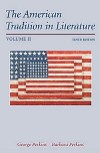You can read the following poems (and in some cases hear audio versions) by clicking on their titles, or by consulting your textbook. The e-notations provided below offer links to sites that offer background or otherwise illuminate the works. Enjoy! "Her Kind" See page 1641 in The American Tradition in Literature, Volume II, 10/e See page 1912 in The American Tradition in Literature, Shorter Edition, 10/e Sexton makes frequent allusions to the history and myths surrounding witches. For links to many different legends involving witches, click here. In the poem's final stanza, Sexton alludes to the torture and murder of accused witches ("...your flames still bite my thigh/and my ribs crack where your wheels wind" (ln 18-19)). The Salem Witch Trials are an important chapter in the history of witch persecution, not to mention in the history of the United States. Click here to see a vast collection of primary sources related to these witch trials. You can also go to the official website of the Salem Witch Museum for a quick overview of these 17th-century events. To learn more about the history of witch hunts in other countries, visit this site.
"All My Pretty Ones" See page 1643 in The American Tradition in Literature, Volume II, 10/e See page 1914 in The American Tradition in Literature, Shorter Edition, 10/e The title of the poem comes from Act IV, Scene iii of Shakespeare's Macbeth. Read the scene. Why do you think Sexton chose this quote as a title for her poem? This poem deals at one level with the death of Sexton's father, in 1959. To read more about Sexton's life, click here. Sexton refers to several historical events. To learn about the presidency of Herbert Hoover (ln. 23), click here. To learn more about Prohibition (ln. 25), the period of time in United States history when alcohol was banned by the government, take a look at this site. To find information about the Hindenburg disaster, try this site. Toward the end of the poem, Sexton uses the phrase "hurly-burly." Do you know where this phrase comes from? Try to find out, using the Internet as a research tool. (Hint: Try to find a site where you can search famous quotations.) Were you surprised by this phrase's origin? What meaning does it have in Sexton's poem?
|



 2003 McGraw-Hill Higher Education
2003 McGraw-Hill Higher Education